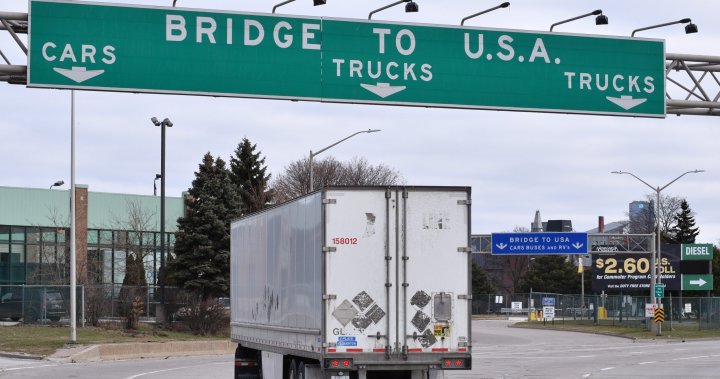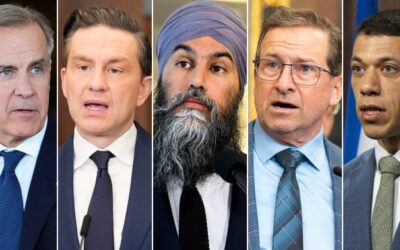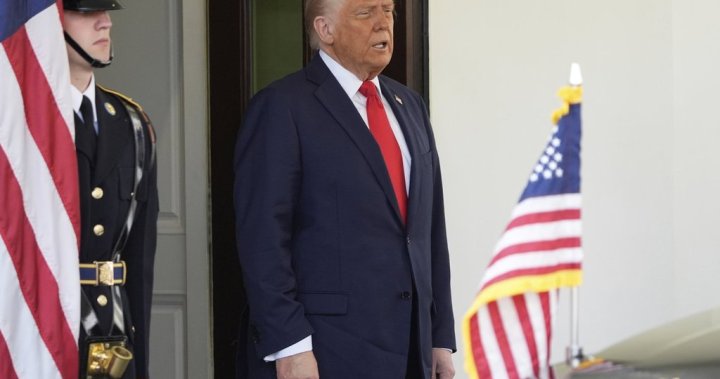Americans value Canada-U.S. trade more than other partnerships: polling – National

A large plurality of Americans believe trade between the U.S. and Canada benefits both countries compared to the U.S.’s other trading partnerships like China and Mexico, polling suggests — but that view has somewhat soured amid U.S. President Donald Trump’s harsh rhetoric and tariffs.
A new report from Pew Research Center this week found 44 per cent of Americans surveyed late last month saw equal benefits for the U.S. and Canada from bilateral trade.
By contrast, 34 per cent said trade between the U.S. and Mexico benefits both countries, while only a quarter said the same about trade with China.
Just 10 per cent said the U.S. benefits more from trade with Canada, whereas 26 per cent said Canadians get the better deal.
The latter number has grown 12 points since 2023 — largely thanks to Republicans.
Among conservatives and right-leaning voters surveyed, 46 per cent said Canada benefits more, more than double the number who said so two years ago, while less than 10 per cent of Democrats said they feel the same.

Canada, Mexico and China are the top three trading partners of the U.S., but the U.S. trade deficit with Canada is lower than the other two countries, according to U.S. government data.

Get breaking National news
For news impacting Canada and around the world, sign up for breaking news alerts delivered directly to you when they happen.
Last year, Canada exported US$35.7 billion more in goods and services to the U.S. than it imported. That pales in comparison to the US$263.3 billion trade deficit with China and the US$179 billion deficit with Mexico.
Economists have pointed out Canada actually has a trade surplus with the U.S. when oil exports are removed from overall trade figures. Yet Trump has repeatedly pointed to the trade deficit, which he has overstated at around US$200 billion and falsely called a “subsidy,” as one of many grievances he has with Canada.
Since his election in November, Trump has imposed waves of tariffs on Canadian goods and some of the most valuable cross-border trade sectors, including autos and steel and aluminum.
At the same time, he has repeatedly insisted Canada should be a 51st state and mocked former prime minister Justin Trudeau by calling him “governor” of that hypothetical state.
That rhetoric has softened since Trudeau resigned and was replaced by Liberal Leader Mark Carney, who Trump and his allies have referred to as prime minister.

Trump also exempted Canada from his so-called “reciprocal” global tariff policy announced last week, yet he did not reduce or lift existing tariffs on Canada when he enacted a 90-day “pause” on duties for other countries on Wednesday.
A Leger poll released this week found a large number of both Canadians and Americans feel “angry” about Trump’s latest round of tariffs. Thirty-two per cent of Canadian respondents and 27 per cent of Americans said they feel “anxious,” according to that poll.
Ipsos polling for Global News released last month found Canada-U.S. relations is among the top concerns for voters in the upcoming federal election, behind only affordability and the cost of living in a ranked list of issues.
Trump’s tariffs have dominated the Canadian election campaign, with all party leaders promising measures to strengthen and diversify the economy away from the U.S. and seek domestic solutions in defence and auto industries.
Carney, who is campaigning for re-election as Liberal leader, has said he and Trump agreed in a phone call last month that Canada will hold “comprehensive negotiations” with the Trump administration on trade and security after the election on April 28.
Conservative Party Leader Pierre Poilievre on Thursday called Trump’s decision to pause global tariffs for 90 days on its trading partners while keeping other tariffs on Canada a “historic mistreatment of Canada.”
U.S. Trade Representative Jamieson Greer told lawmakers on the U.S. House Committee on Ways and Means Wednesday that he values North American free trade rules under the Canada-U.S.-Mexico Agreement (CUSMA), which Americans call the USMCA, but said there are issues with the pact that need addressing when it comes up for review next year.
That includes blocking China and other nations from using Canada and Mexico as a backdoor to the American market, he said, but could also mean fighting Canada’s supply management system for agricultural sectors like dairy.
“Goods between Canada and the United States that follow the rules of (CUSMA), they continue to trade on a duty-free basis, which makes sense,” he said.
“I continue to work with my Canadian counterparts to make sure that relationship is one where we can have fair trade.”
Committee members that represent northern border districts like upstate New York noted they have seen declines in Canadian tourism since Trump began imposing tariffs and leveling threats of annexation against Canada, and urged Greer to pursue negotiations that strengthen the cross-border relationship.
Data released by Statistics Canada on Thursday showed Canadian visits to the U.S. plummeted last month by nearly 32 per cent compared to March 2024, the third consecutive month of year-over-year declines and the steepest plunge since the pandemic.
—with files from the Canadian Press
© 2025 Global News, a division of Corus Entertainment Inc.








